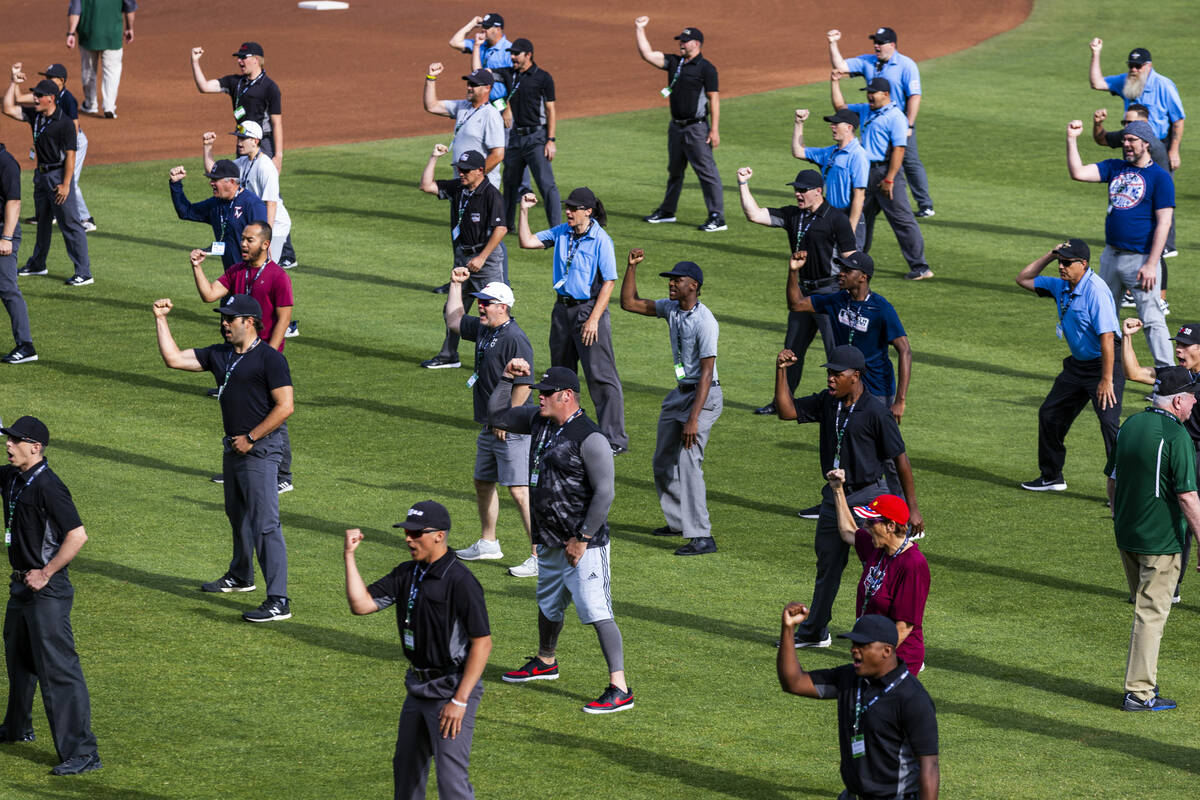So you want to be a MLB umpire — it’s not that easy

Gunner Lowe has a dream. He’s had it since he was 12 years old. Since he called whiffle ball games in the backyard of his house.
Since his youth baseball teammates made fun of him for it.
He wants to become a Major League umpire. He’s 18.
“I like being in charge,” Lowe said. “When a coach comes firing out of the dugout, I’m excited and ready for the moment. I sure hope that I get there one day. It’s the long-term goal.”
He isn’t alone.
Major League Baseball hosted a free umpire camp Saturday at Las Vegas Ballpark, where 125 folks of all shapes and sizes and ages congregated to sharpen their skills and learn from former MLB umpires and current supervisors.
Must be coachable
The goal: To not only instruct on how to successfully umpire at all levels, but to identity five to 10 prospects who might one day be calling balls and strikes at an MLB stadium nearest you.
Those selected will be tendered a scholarship for a prospect development camp in January in Vero Beach, Florida. They will be given every chance to begin their careers in the minor leagues and, much like the players they share a field with, advance to the highest of levels.
“The biggest thing you want to see is if someone is coachable,” said Cris Jones, MLB’s umpire supervisor. “We can’t make a major league umpire in four hours. You have to be disciplined and want to improve. We’re like a scout — we can draft them but not always develop them. It’s all dependent on the person.
“Coach them through mistakes and, if on the second or third rep they get it, then we know we have someone we can potentially mold into a professional umpire.”
There were three stations set up to teach different phases of calling a game, from the strike zone to fair/foul plays to a two-umpire system on double plays. Out. Safe. Proper positioning and footwork.
It was all covered.
There wasn’t one, however, for how to handle those ever-constant boos from the stands or, as Lowe puts it, a coach firing out of a dugout.
Guess you have to experience such things firsthand to know what it’s all about.
But not everyone in attendance had the goal of running onto a MLB field. Some have other dreams.
Rod Jackson is from Mesa, Arizona, and has been calling games for 25 years. He has worked some in spring training but prefers major college ball. He also knows the importance of such camps for a young umpire like Lowe. Understands how vital such instruction is.
“It gives them a heads-up on what to expect and what they look for so they can continue to learn,” Jackson said. “This is your base level. You just have to keep getting repetitions and coming to these camps and getting noticed. And, one day, you might get that call.”
Sense of humor
Lowe is from Payson, Utah — a good 30 minutes from Provo — and attends Southern Utah University. He has been booed before but insists he doesn’t let it affect him. He remains in the moment. He has called high school and some college fall ball games to date.
It’s always front and center. The dream.
“I just worry about what’s happening on the field,” Lowe said. “I never wanted to be a player. I’ve just wanted to be an umpire.”
It also helps to have a good sense of humor. As one former MLB umpire prepared to address the gathering Saturday, he was greeted with a robust round of applause.
“I’d feel more comfortable,” he said, “if you booed me.”
Contact Ed Graney at egraney@reviewjournal.com. Follow @edgraney on X.